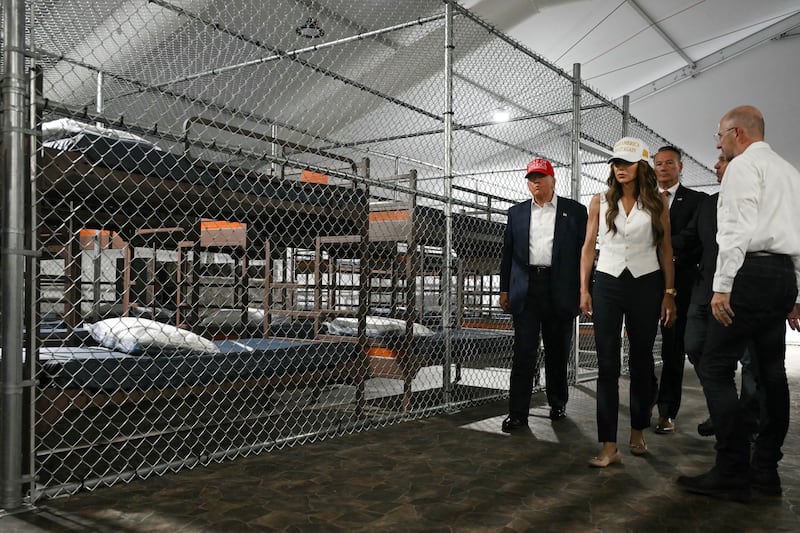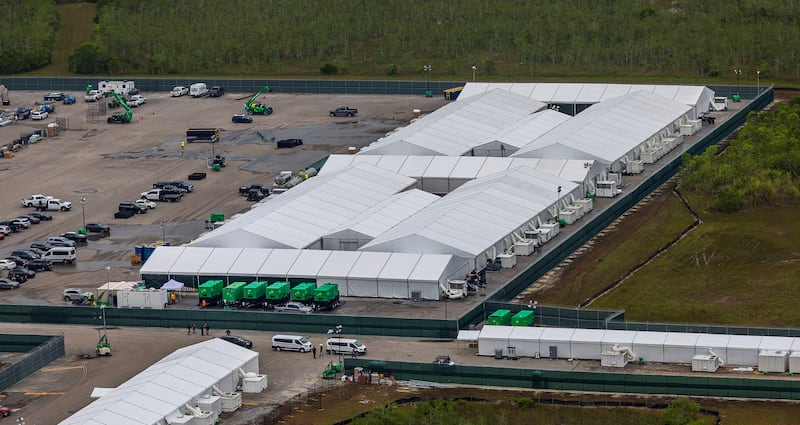A federal judge ruled that President Donald Trump’s prized “Alligator Alcatraz” detention center must close, striking a blow to the administration’s mass deportation efforts.
The center was thrown together in just eight days on an abandoned airstrip in the middle of the Florida Everglades and has been rocked by allegations of abuse, including reports of assaults, groping, and inhumane living conditions.
MAGA loyalists like Governor Ron DeSantis have nevertheless reveled in the optics of housing migrants in the middle of alligator-infested swamplands, saying that if they escape, they’ve “got nowhere to go.”
Trump visited and praised the facility, encouraging other states to replicate it. The administration faces a shortage of detention centers to house people rounded up during the president’s immigration crackdown.

Now, though, a judge has ordered the facility to shut down due to environmental concerns.
The state violated federal environmental laws by building the facility—which is made up of massive tents erected on an abandoned airstrip, with giant cages that hold 35 to 38 inmates—without conducting any environmental assessments or impact statements, U.S. District Judge Kathleen Williams ruled Thursday.
“Here, there weren’t ‘deficiencies’ in the agency’s process,” Williams wrote. “There was no process.”
The facility is federally funded and therefore subject to the National Environmental Policy Act, which requires environmental studies be conducted before any “major” federal action or construction project.

The ruling requires the state to begin dismantling parts of the facility—including its temporary fencing, lighting fixtures and generators—within 60 days.
Both DeSantis and the Trump administration have said the facility didn’t impact the environment since the airstrip was already there before the site became a symbol of the president’s domestic policy.
“It’s a lazy lawsuit, and it ignores the fact that this land has already been developed for a decade,” Department of Homeland Security Secretary Tricia McLaughlin told the Washington Post when the suit was filed in late June.
But Williams found that Alligator Alcatraz—which is located in Big Cypress National Preserve, an area the Florida legislature has designated as a conservation zone—did in fact pose “myriad risks” to its sensitive surroundings.
Runoff and wastewater discharge threatened to harm the Everglades, while flood lighting reduced the habitat for protected animals by 2,000 acres. Members of the Miccosukee Tribe testified that they had lost access to trails used for hunting and harvesting ceremonial and medicinal plants.
Kevin Gurthrie, executive director of Florida’s Division of Emergency Management, quickly appealed the ruling, according to Axios. DeSantis had been expecting an “adverse ruling” and prepared an immediate appeal, he told Fox News.
The governor’s communications director, Alex Lanfranconi, told the Daily Beast in a statement, “The deportations will continue until morale improves.”
Already Williams, an Obama appointee, had ruled earlier this month that workers had to halt construction on the site—which was slated to hold as many as 3,000 detainees—while the lawsuit played out.
It was brought by two environmental groups, Friends of the Everglades and the Center for Biological Diversity, who argued that the project could undermine billions of dollars in Everglades restoration efforts.
On July 16, civil rights lawyers filed a separate lawsuit seeking a temporary restraining order against the detention center, alleging that detainees are being held without charge, denied access to attorneys, and that immigration courts have canceled bond hearings.
Detainees also say they’ve been fed spoiled food, denied religious rights, given limited access to showers and working toilets, and faced mosquitos and oppressive heat.
A former guard told NBC Miami earlier this month that the facility was like an “oversized kennel.”






